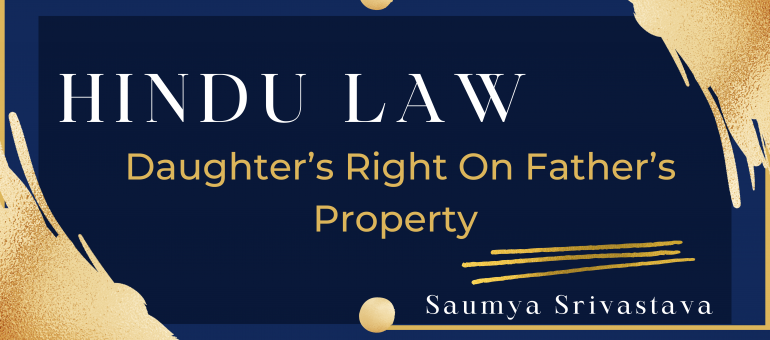Hindu Law: Daughter’s Right On Father’s Property
Table of Contents
Introduction regarding Hindu Law
This international carries a population of 8 billion, out of that one.38 billion parents sleep in the Asian nation presently. India is a country in which one-of-a-kind faith like Hindu, Muslim, Sikh, Christian, and Parsi stay alongside which indicates secularism. In India there are styles of legal guidelines are mentioned:
General regulation
Personal regulation
General regulation consists of the IPC, Constitutional regulation, Indian Contract Act and plents of extra, and consequently the Personal regulation consists of Hindu regulation, Muslim regulation and masses of extra that we can talk the Hindu Law at some stage in this article.
Origin of Hindu Law
In Dharmasastra there may be no phrase like Hindu; it is a far off origin. The phrase Hindu got here into life via Greeks. This country got here to be refered to as Hindustan and its humans as it is parents as Hindu as withinside the history, the phrase Hindu now no longer completely specifies a faith, but it conjointly specifies a country primarily. The Hindu regulation has been adjusted via centuries and been cojointly residing when you consider that closing 5000 years and has cojointly persevered to manipulate the social and moral parent of Hindu existence through following the diverse a part of Hindu cultural existence.
Concept of Dharma
We recognize that the phrase Dharma is stated to Hindu regulation. Let Maine elaborate to you, the phrase Dharma in step with Hindu Mythology advocates that duty. Watching the contexts and consequently, the non-secular references Dharma has absolutely one of a kind meanings as an alternative like, the Buddhists accept as true with that the phrase Dharma advocate that completely a conventional regulation this is extraordinarily lots of critical and consequently the Jains and consequently the Sikhs accept as true with that it is completely a non-secular route for the fulfillment of the reality.
According to the Hindu Jurisprudence, Dharma advocate that obligations in lots of ways, as an alternative just like the social technological know-how obligations, prison obligations or spiritual obligations. Through this context, we’re capin a position to mention that Dharma could be remarked due to the fact the notion of justice.
Who are Hindus?
Hindus are folks who are Hindu in any shape inclusive of Jain, Sikh and are born to Hindu parents.
The Supreme Court of India withinside the landmark case of Shastri vs Muldas at once described the time period Hindu. The case is associated with the Swami Narayan temple in Ahmedabad. There are a set of humans known as the Satsangi who have been heading the temple and that they restrained non-Satsangi, Harijans to go into the temple. They said that Satsangi is a one of a kind faith and they’re now no longer hurdled through Hindu Law. The Supreme Court of India held that the Satsangi, Arya Samaj is and Radhaswami, some of are blanketed to the Hindu faith due to the fact they’re derived from Hindu philosophy.
Rights of Daughter on assets in keeping with Hindu regulation / Hindu Law :
Now Daughter has identical rights of assets beneath neath Hindu regulation:
A three-decide bench Justice S.Abdul Nageer & Justice M.R Shah headed through Justice Arun Mishra stated:
Daughters have to take delivery of identical rights as sons. The daughter stays a loving daughter in the course of existence. The daughter shall continue to be a coparcener in the course of existence, no matter whether or not her father is alive or now no longer.
Justice Mishra stated daughters ought to take delivery of identical percentage of coparcenary rights in the percentage of assets just like the son. The bench additionally held that rights beneath neath the modification are relevant to residing daughters of residing coparceners as of September 9, 2005, no matter while such daughters are born.
The provisions contained in substituted Section 6 of the Hindu Succession Act, confer repute of coparcener (identical shareholders whilst inheriting properties) at the daughter born earlier than or after the modification, withinside the equal way as sons, with equal rights and liabilities. Since the proper in coparcenary is through birth, it isn’t always vital that the daddy of the coparcener must be residing as on September 9, 2005 (the date while the regulation got here into force), the bench ruled.
The pinnacle courtroom docket, but, stated that a registered agreement or partition in shape decreed previous to December 20, 2004, will now no longer be reopened, in a flow to prevent reopening of in advance settlements.
The ultimate courtroom docket had in advance given conflicting decisions in cases ” Prakash V. Phulavati (2015) and Danamma Suman Surpur vs. Amar (2018).
In Prakash V. Phulavati (2015), a bench comprising Justices Anil R. Dave and A.K. Goel had stated ˜the rights beneath neath the modification are relevant to residing daughters of residing coparceners as on September 9, 2005, irrespective of while such daughters are born’.
In the second one case, of Danamma Suman Surpur vs. Amar (2018), the bench comprising Justices A.K. Sikri and Ashok Bhushan had stated that ˜the proportion of the daddy who died in 2001 could additionally devolve upon his daughters who could be entitled to a percentage withinside the assets’.
Know more about RTI ACT ( RIGHT TO INFORMATION ) 2005
Like and Follow us on :
Facebook Twitter Instagram LinkedIn

